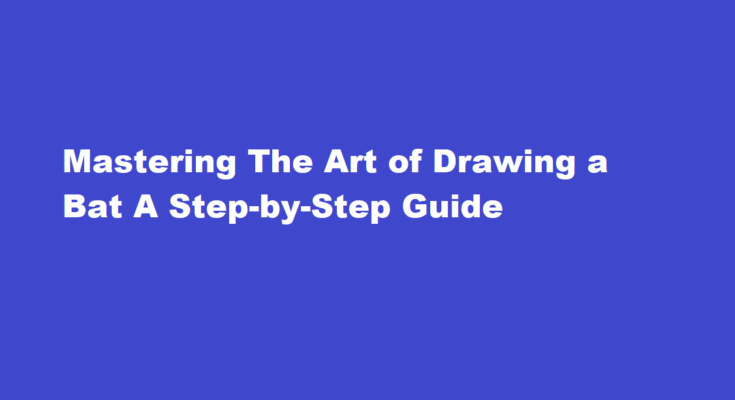Introduction
Drawing is a creative outlet that allows us to bring our imagination to life on paper. One intriguing subject for artists of all levels is the bat—a creature shrouded in mystery and often associated with the supernatural. In this step-by-step guide, we will explore how to draw a bat in a way that captures its elegance and mystique.
Materials Needed
Before we dive into the drawing process, it’s essential to gather the right materials. Here’s what you’ll need
1. Pencils A set of graphite pencils (ranging from 2H for light lines to 6B for dark shading).
2. Drawing Paper A smooth, high-quality paper, preferably with some texture.
3. Erasers A kneaded eraser for subtle corrections and a regular eraser for more substantial changes.
4. Reference Images Find pictures of bats for reference.
Basic Shapes
Begin by sketching the bat’s basic shapes. Start with a large oval for the body, slightly elongated. Draw two smaller ovals on either side for the wings and a circle for the head. Position the head slightly above the body. These shapes will serve as your initial guidelines and help you maintain proportions throughout the drawing.
Wing Structure
Now, refine the wings. Extend curved lines from the smaller ovals to create the wing structure. Bats have long, slender wings with distinct joints. Pay attention to the curvature of these lines to achieve a natural look. You can use reference images to ensure accuracy. Remember, the wings should be symmetrical, so take your time to balance them.
Body and Head Details
Add more details to the bat’s body and head. Sketch the ears on top of the head, and draw a small, triangular snout. Bats have sharp teeth, so add tiny triangular shapes for the mouth. To create depth, draw a line down the center of the body to indicate the spine.
Tail and Legs
Now, add the tail and legs. Bats have a short, tail-like extension, so draw a small, pointed shape at the base of the body. For the legs, depict them as thin and delicate, with curved lines for the joints. Don’t forget the clawed toes at the end.
Eyes and Facial Features
Refine the facial features. Draw two large, expressive eyes near the top of the head. Bats have keen senses, so emphasize their eyes with careful shading. Add small, pointed eyebrows above the eyes. Finally, refine the snout by adding nostrils and emphasizing the shape of the mouth.
Wing Texture
Detail the wings to make them look realistic. Bats have thin membranes stretched between their fingers, so use fine, curved lines to represent this texture. You can also add small veins to give the wings depth and dimension. Take your time, as this step requires precision.
Shading and Texture
To bring your bat to life, start shading. Bats are often dark in color, so use your pencils to create gradations of shade. Darken the body and wings, leaving some areas lighter for highlights. Pay attention to the areas where light would hit, such as the top of the head and the edges of the wings. Use different pencil grades for subtle variations in shading.
Final Touches
As you near completion, evaluate your drawing. Add any final details or corrections. Use your erasers to clean up any stray lines or smudges. Ensure that your bat looks balanced and anatomically accurate. If desired, you can create a background or add additional elements to your drawing to enhance its context.
FREQUENTLY ASKED QUESTIONS
What is a bat for kids?
Bats are the only mammals that can truly fly. Sometimes people mistake bats for birds. But bats are more closely related to other mammals—including humans—than they are to birds. And bats do not have feathers.
Is A bat A Mama?
Just like us bats are mammals so mother bats have to be ready to feed their pups plenty of milk. Going out to find food for themselves, mother bats come back to their roosts to take care of and nurse their babies. A female hoary bat is perched with her twin young.
Conclusion
Drawing a bat may seem challenging at first, but with patience and practice, you can master the art of capturing its mystique and elegance on paper. Remember to reference images, pay attention to details, and use shading to add depth. With each drawing, you’ll improve your skills and unlock your creativity. Happy drawing!
Read Also : Silencing Your Apple Watch A Step-by-Step Guide



